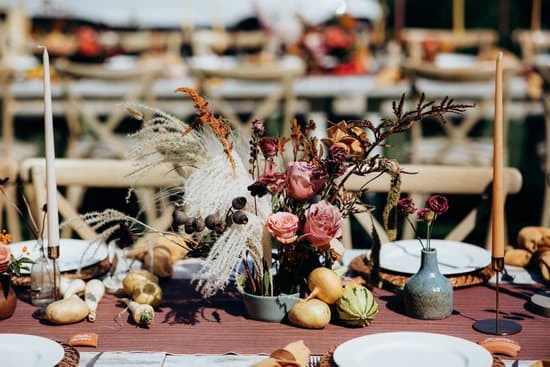When it comes to planning a wedding, there are numerous details to consider, including the role of the officiant. Many couples wonder, “Is the officiant part of the wedding party?” The answer to this question can vary depending on different cultural and religious traditions. In this article, we will explore the role of the officiant in a wedding ceremony and address whether or not they are considered part of the wedding party.
The officiant plays a crucial role in the wedding ceremony, as they are responsible for leading the proceedings and officially marrying the couple. However, their role is distinct from that of the wedding party. While the wedding party typically consists of close friends and family members who play specific roles in the celebration, such as bridesmaids and groomsmen, the officiant’s responsibilities primarily revolve around overseeing the marriage ceremony itself.
One key difference between the wedding party and the officiant is their roles and responsibilities leading up to and during the wedding day. The wedding party often takes part in pre-wedding activities, such as bridal showers and bachelor parties, while also having specific duties during the ceremony, such as holding bouquets or rings.
On the other hand, the officiant focuses on guiding and performing a meaningful marriage ceremony for the couple. Throughout this article, we will delve into traditional expectations surrounding both roles and discuss potential ways to include an officiant within a couple’s celebratory plans.
The Difference Between the Wedding Party and the Officiant
The officiant’s role in a wedding is unique and distinct from that of the traditional wedding party. While the wedding party typically consists of close friends and family members of the couple, the officiant serves as the individual who leads the ceremony, legally binds the couple in marriage, and often plays a significant role in setting the tone for the entire event.
Role and Responsibilities
The officiant, whether it be a religious figure, a judge, or a friend ordained for the occasion, holds a position of authority during the wedding ceremony. Their primary responsibility is to ensure that the marriage is conducted according to legal requirements and any specific cultural or religious traditions that may be involved. In addition to leading the vows and exchanging of rings, they may also offer guidance and support to the couple throughout the process of crafting their wedding ceremony.
Relationship to Wedding Party
While members of the wedding party are typically chosen for their close personal relationship with the couple, such as siblings, best friends, or other important figures in their lives, the officiant is often someone chosen for their particular expertise in leading ceremonies. This means that while they play an integral role in bringing together two people in marriage, they are not necessarily part of the bride or groom’s close circle of friends.
However, some couples do choose to include their officiant as an honorary member of their wedding party as a way to honor their contribution to their special day.
Traditional Wedding Party Roles and Responsibilities
Traditionally, the wedding party consists of the maid of honor, best man, bridesmaids, groomsmen, flower girl, and ring bearer. Each member of the wedding party has specific roles and responsibilities to fulfill leading up to and during the wedding day. The maid of honor and best man serve as the chief supporters of the bride and groom, often helping with wedding planning, organizing pre-wedding events like bridal showers and bachelor parties, and offering emotional support on the big day.
Roles and Responsibilities
The maid of honor is typically responsible for assisting the bride with tasks such as dress shopping, addressing invitations, and coordinating with bridesmaids. On the other hand, the best man is usually in charge of organizing the bachelor party, holding onto the bride’s ring during the ceremony, and giving a toast at the reception. Bridesmaids and groomsmen also play important roles in supporting the couple throughout their engagement.
The Officiant’s Role
Unlike members of the traditional wedding party who focus on providing support to the couple before and during their wedding day, an officiant has a more formal role that is centered around conducting the ceremony itself. While not a part of the wedding party per se, an officiant is a key figure in bringing a couple together in marriage.
Their duties include leading the ceremony proceedings, guiding guests through rituals or customs (if applicable), pronouncing that all-important “I do,” and signing necessary legal documents. This illustrates that while not part of typical bridal parties or groomsmen groups who provide emotional support before walking down the aisle – they are central to any marriage as they make it official right there on stage.
The Officiant’s Role in the Ceremony
The officiant plays a crucial role in the wedding ceremony, as they are responsible for leading the proceedings and declaring the couple’s marriage. The officiant can be a religious figure, such as a priest or rabbi, or a civil officiant, depending on the couple’s preferences. Regardless of their title, the officiant is an essential part of the ceremony and is not typically considered to be part of the wedding party.
During the ceremony, the officiant is often positioned at the front of the venue, where they will conduct the proceedings and guide the couple through their vows and exchange of rings. They may also deliver a message or speech about love and marriage, providing guidance and inspiration to the newlyweds as they begin their life together. Additionally, the officiant ensures that all legal requirements for marriage are met, such as obtaining signatures on the marriage license.
Including an officiant in wedding planning is important to ensure that both parties have a clear understanding of what to expect during the ceremony. The couple should have open communication with their chosen officiant to discuss any specific customs or traditions they would like to incorporate into their ceremony. By collaborating with the officiant, couples can personalize their ceremony to reflect their beliefs and values, creating a meaningful and memorable experience for everyone involved.
Including the Officiant in Wedding Planning
When it comes to planning a wedding, the officiant often plays a crucial role in the process. While they may not be a part of the traditional wedding party, the officiant is still an integral part of the wedding celebration. Involving the officiant in the wedding planning process can help ensure that the ceremony reflects the couple’s values, beliefs, and personalities.
One way to include the officiant in wedding planning is to schedule meetings to discuss the ceremony details. This can involve choosing readings, selecting music, and deciding on any special rituals or customs that may be incorporated into the ceremony. Additionally, some couples choose to involve their officiant in pre-marital counseling or spiritual guidance sessions leading up to the big day.
Another important aspect of including the officiant in wedding planning is communication. Clearly communicating your expectations and desires for the ceremony with your officiant will help them understand your vision for this special moment. It is also essential to be open to their suggestions and ideas, as they bring experience and expertise that can enhance the ceremony.
Finally, involving the officiant in other pre-wedding events can also strengthen your relationship and collaboration. This may include inviting them to engagement parties, rehearsal dinners, or even bridal showers. These opportunities allow for deeper connections with your officiant and create a more meaningful and personal ceremony experience for everyone involved.
| Including the Officiant | Wedding Planning |
|---|---|
| Important role in crafting ceremony details | Discussion about readings, music & rituals |
| Open communication is key | Expressing desires & being receptive to suggestions |
| Participation in pre-wedding events | Engagement parties, rehearsal dinners & bridal showers |
Etiquette and Protocol for Including the Officiant in the Wedding Party
When it comes to including the officiant in the wedding party, there are certain etiquette and protocol to consider. While the officiant plays a crucial role in the wedding ceremony, they are not traditionally considered as part of the wedding party. However, modern weddings have seen a shift in this tradition, with many couples choosing to include their officiant as an honorary member of the wedding party.
- Consider their religious or cultural customs: If your officiant is a religious or cultural leader, it’s important to respect their customs and guidelines when it comes to including them in the wedding party.
- Communicate openly: Before making any decisions, communicate with your officiant about your desire to include them in the wedding party. Make sure they are comfortable with the idea and discuss any concerns or preferences they may have.
- Plan their responsibilities: If you decide to include the officiant as part of the wedding party, outline their responsibilities clearly. This may include participating in pre-wedding events, such as rehearsal dinners, or standing alongside the bridal party during the ceremony.
It is important to remember that every wedding is unique, and there is no one-size-fits-all approach to including the officiant in the wedding party. Ultimately, it is up to each couple to decide what feels right for them and their special day. Balancing tradition with personal preferences can help create a meaningful and memorable celebration for everyone involved.
Creative Ways to Include the Officiant in the Wedding Celebration
When it comes to including the officiant in the wedding celebration, there are many creative ways to show your appreciation for their role in your special day. Here are some unique and thoughtful ideas for including the officiant in the wedding celebration:
- Dedicate a Special Moment: During the ceremony or reception, you can dedicate a special moment to honor the officiant and express your gratitude for their involvement. This could include a reading, a speech, or even a toast dedicated specifically to the officiant.
- Include Them in Photos: Just like the rest of the wedding party, the officiant plays a significant role in your wedding day. Including them in photos with the bride, groom, and bridal party is a great way to recognize their importance and commemorate their participation in the celebration.
- Personalized Thank You Gift: Consider giving the officiant a personalized thank you gift as a token of appreciation for their role in your wedding. This could be something sentimental or meaningful that reflects your relationship with them and expresses your gratitude for their services.
Including the officiant as part of the wedding party is not always common practice. However, it can be a meaningful way to acknowledge their significance in your life and honor their role in your marriage. Whether you choose to include them as part of the official wedding party or simply show them appreciation in other ways, recognizing and celebrating the officiant’s contribution is an important aspect of creating a memorable and meaningful wedding celebration.
The Pros and Cons of Including the Officiant in the Wedding Party
In conclusion, the decision to include the officiant in the wedding party is one that should be carefully considered by the couple. While some may view the officiant as an integral part of the wedding celebration and choose to include them in the wedding party, others may prefer to maintain a distinction between the two roles. Ultimately, it is important for couples to weigh the pros and cons of including the officiant in the wedding party before making a decision.
One of the main advantages of including the officiant in the wedding party is that it can help to create a sense of unity and cohesion among all those involved in the ceremony. By including the officiant in pre-wedding activities and photos, they can feel like an integral part of the celebrations. Furthermore, it can also be a way to show appreciation for their role in making the ceremony special.
On the other hand, there are certain drawbacks to including the officiant in the wedding party. Some couples may feel that it blurs the line between their personal relationships and professional obligations. Additionally, there may be logistical considerations to take into account, such as whether or not they will be expected to participate in certain pre-wedding events or rehearsals.
Ultimately, whether or not to include the officiant as part of the wedding party is a personal decision that each couple should make based on their own unique circumstances and preferences. It is important for couples to communicate openly with their officiant about their expectations and considerate of their feelings when making this decision.
Frequently Asked Questions
Is the Officiant Considered the Wedding Party?
The officiant is not traditionally considered part of the wedding party. They play a different role in the ceremony, focused on leading and solemnizing the marriage, rather than participating as a member of the wedding party.
Is the Officiant Part of the Processional?
Typically, the officiant is not part of the processional. They usually arrive separately and take their place at the front before the processional begins. Their role is to lead and conduct the ceremony rather than walk in with the wedding party.
Should the Officiant Match the Wedding Party?
It is not necessary for the officiant to match the wedding party in terms of attire. They are usually dressed in formal attire suited to their role as an officiant, rather than coordinating with bridesmaids or groomsmen. However, it’s important that their attire still fits the overall style of the wedding.

I have been involved in marriages for over 20 years helping couples and singles understand more about them.





